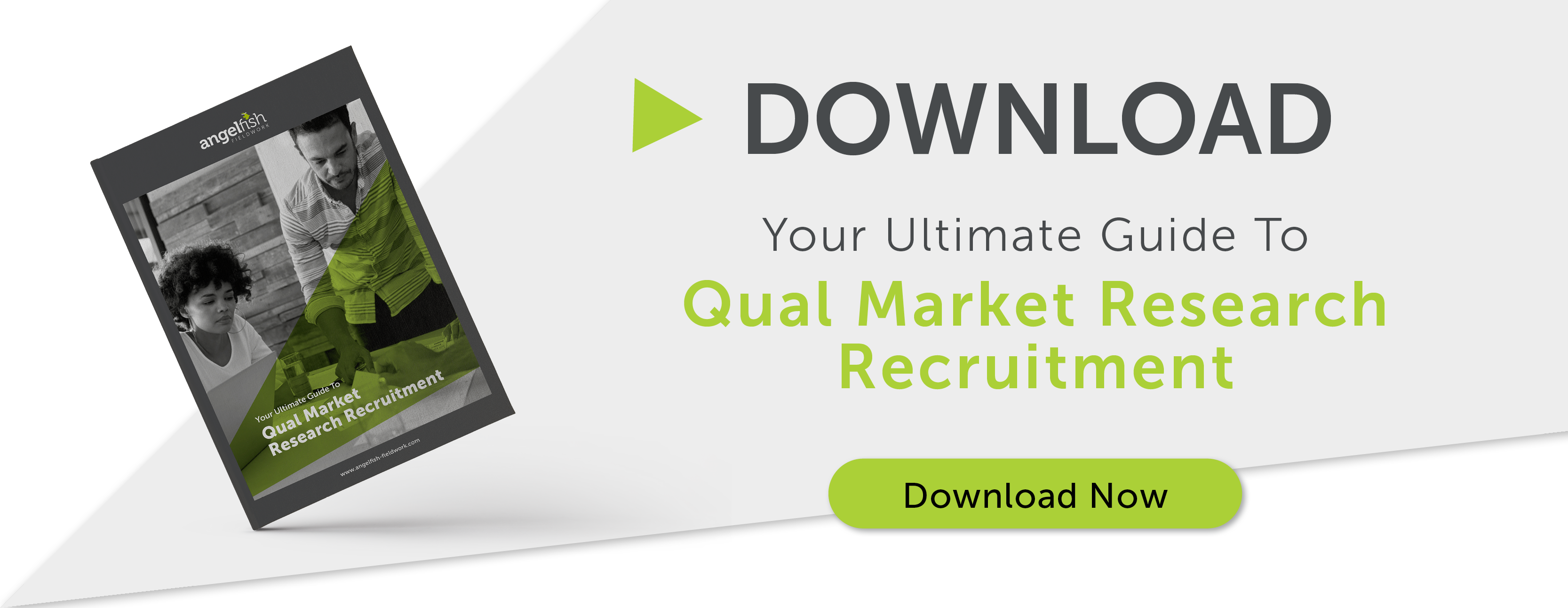
The Five Basic Rules of Briefing Your Market Research Recruitment Agency
Once you’ve established the feasibility of your project and decided on a sample size, it’s time to start finding market research participants.
Have you ever asked a market research recruiting agency to help you with a project but been disappointed with the quality of the participants they found? Perhaps they weren’t quite what you asked for, or maybe they didn’t fill the necessary criteria?
Thankfully, it’s easy to make sure it doesn't happen again. It’s all down to communicating and collaborating with your agency right from the beginning to ensure you are on the same page throughout the entire recruitment process.
Creating a market research recruitment brief is crucial for the success of your project; but when the pressure is on and time is short, it’s also one of the first things that gets dropped. However, if you want to get the most out of your market research participants and save time in the long run, it’s an unmissable step.
It’s also a chance to define key dates and milestones such as when recruitment needs to be completed or when last-minute dropouts need to be replaced by, and it allows everyone to identify any challenges and iron out any potential difficulties too. Here’s how...
Follow these five steps to create a top-quality brief for your market research recruitment agency:
1. Get to know the team
At the beginning of the briefing process, we’d recommend an introductory call to kick things off so you can get to know exactly who you are working with. By clearly understanding everyone’s role and responsibilities it means you can get to know their abilities and really utilise their strengths.
Make sure you have the contact details of everyone involved, but most importantly you should know who your main point of contact is and exactly who will be responsible for your fieldwork on a daily basis.
You should also be careful to note down any holidays or other factors that could influence the project so you can take complete ownership from the very beginning.
By knowing exactly who is doing what and when you can make sure everyone understands the project and their role within it, so nothing holds you back and no details get missed along the way.
Not only that, but by getting to know the market research recruiting agency team and building a rapport with them, everyone will want to work harder for you too.
2. Clearly communicate your goals
As well as getting to know your recruitment team, it’s also important that they fully understand the project. After all, if your agency completely understands your aims and objectives, they will be able to recruit fully informed respondents that fit the necessary criteria.
Additionally, if you communicate clear, defined goals and research objectives to your market research recruitment agency, these can then be shared with your participants where appropriate too, improving respondent engagement so that everyone understands what you are looking to achieve and why.
If you can get your recruiters on board with your objectives early on, they can really help get behind your study and give valuable advice along the way should they spot anything during fieldwork that is not working in line with what you are trying to achieve.
Don’t worry; there’s no need to be afraid of sharing this type of information. By ensuring there’s open communication, it means you can be completely sure everyone knows their role and that your project goes off without a hitch.

3. Define the screening criteria
Knowing how to write a market research recruitment brief also means knowing how to define your screening criteria, and ensuring that it is as clear as possible so that your agency can find the most relevant candidates.
Make sure you’re clear about any flexibility around your criteria and that they know the difference between the nice-to-haves and absolutely essential must-haves.
Not only will this help them find the best people possible, but it also means they can keep the not-so-perfect candidates on hold and go back to them if recruitment proves tougher than expected.
It’s all about having a strong relationship with your recruiter and making sure your agency understands your needs well enough that they can make that call.
For example, you could be looking at men who watch football, men who watch football and support Manchester United, or men who earn three million a year, watch football and support Manchester United whilst drinking cider.
The devil's in the detail, but by letting your recruiter know the must-haves (earns three million and supports Man U) and the nice-to-haves (drinks cider), they can make the right call and ensure they are making the right recruitment decisions for you.
Most importantly, clear screening criteria ensures that there are no hidden surprises in the screening process that could negatively impact your recruitment and ruin your research before it’s even begun.
By ensuring only relevant market research participants are being put forward, you can lower your recruitment costs and make sure you don’t waste any time interviewing participants who just don’t cut the mustard. Here are three general rules to follow:
Prioritise your needs
By identifying the most important things within your criteria you can prioritise them and choose where to be flexible, giving you a valid yet decent-sized pool of potential participants.
For example, you might not be able to be flexible with the gender of the people you are choosing to interview, but could you broaden the age range? There are always things you can tweak.
Assess your objectives
Assessing your objectives and picturing the final results enables you to decide what will make a difference to your research and why. Could you still get the results you need without being unnecessarily detailed? If so, it’s time to tweak your criteria.
Review your methodology
Will your chosen methodology impact your qualifying criteria? If you are conducting a focus group or face-to-face interviews, you will only be able to recruit candidates in a certain geographical area - which in addition to your chosen demographic could make response rates too low.
Could you use another type of methodology such as online methods that won’t limit your location instead?

4. Agree on progress reports
Another thing you’ll need to decide when briefing your agency is how and when you want updates and in what form. From email updates to catch-up calls, you should always be kept in the loop with exactly what’s going on and when.
By having an open and honest approach and keeping in regular communication, it means that your agency can flag any issues or concerns regarding recruitment as soon as possible. When it comes to progress reports, your email updates should include:
Recruitment methods used
From email invites to paid adverts, an overview of exactly what participant recruitment methods have been implemented and where means you can make sure everyone is on the right track to target the right participants in the right places.
Bookings taken
You should also be updated on how many bookings have been taken so far, including how many people have been booked for each location and how many are outstanding, as well as a screener breakdown with respondents’ profiles and details of their answers.
How they are hitting quotas
Perhaps you need five men and women of specific ages with a certain level of education for four different research locations? Some locations will be easier than others, but your agency should let you know how they are prioritising things to make sure they hit all quotas across all locations.
Any questions
From quotas and flexibility to timescales and respondents, giving your agency a chance to ask questions will make sure you’re up to date with everything that is going on and that you have the final say on any suggestions they put forward.
Any challenges
By keeping you in the loop with any challenges they are facing, you can help decide what to do about it.
For example, it could be that they are struggling to recruit market research participants with specific criteria, or that people are screening out on a certain question; by letting you know what they are struggling with you can decide if there is any wriggle room.
The plan of action
Lastly, your agency will let you know what their plans are and what they will be working on until your next update so you can have complete transparency over exactly what will be happening and when.
5. Be clear on consent
At this stage, you should also make sure your chosen market research recruiting agency knows what is and isn’t shareable with candidates, and they will also need to organise the appropriate consent forms or NDAs at this time too. A good reference for the minimum you should expect from your agency is available from the MRS website.
When it comes to consent, the MRS Code of Conduct states that participants must give their informed consent at all times and that they must be provided with sufficient information to make their decision. This information includes the following:
- The name of the organisation or individual responsible for data collection.
- The general subject of the data collection.
- The purpose of the data collection.
- Whether the data collection is to be recorded and/or observed.
- Who is likely to have access to live or recorded information.
- The likely length in minutes of the data collection.
- Any costs likely to be incurred by the participant.
- An assurance that the activity is being conducted in accordance with the MRS Code of Conduct.
So, there you have it!
Now you’ve created a market research recruitment brief for your chosen agency, it’s time to start the recruitment process!
In the meantime, you can get familiar with our top tips for choosing the right qualitative market research recruiting agency by downloading our guide below! We also cover how to determine pricing, outline your project, adhere to codes of conduct and much more...



-Feb-19-2026-09-59-49-0345-AM.png)










